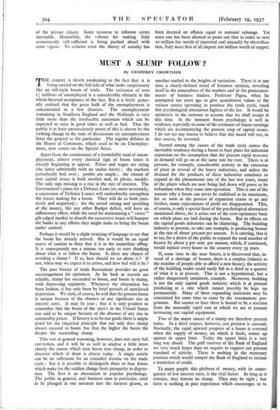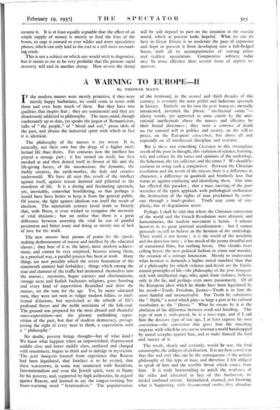MUST A SLUMP FOLLOW .
By GEOFFREY CROWTHER
Apart from the continuance of a formidable total of unem- ployment, almost every classical sign of boom times is already beginning to appear. Prices and wages are rising (the latter admittedly with no undue haste) ; the markets periodically boil over ; profits are ample ; the stream of new capital issues is both swollen and, in places, muddy. The only sign missing is a rise in the rate of interest. The Government's plans for a Defence Loan (or, more accurately, a succession of Defence Loans) will undoubtedly strengthen the forces making for a boom. They will do so both posi- tively and negatively ; for the actual raising and spending of the money, like any other Budget deficit, will have an inflationary effect, while the need for maintaining a" sweet" gilt-edged market to absorb the successive issues will hamper the banks in any efforts they might make to bring the boom under control.
• Perhaps it would be a slight straining of language to say that the boom has already arrived. But it would be an equal excess of caution to deny that it is in the immediate offing. It is consequently not, a minute too early to start thinking about what is to follow the boom. Is there any chance of avoiding a slump ? If so, how should we set about it ? If not, when may we expect it to arrive, and how bad will it be ?
The past history of trade fluctuations provides no great encouragement for optimism. As far back as records are reliable, slump has succeeded to boom, and boom to slump, with depressing regularity. Whenever the alternation has been broken, it has only been by brief periods of unrelieved depression. We shall, of course, be told that the present boom is unique because of the absence of any significant rise in interest rates. It may be true ; but it is only prudent to remember that the boom of the 1920's in the United States was said to be unique because of the absence of any rise in commodity prices. If history is to be our guide there is ample proof for the empirical principle that not only does slump always succeed to boom but that the higher the boom the deeper the succeeding slump.
This sort of general reasoning, however, does not carry full conviction, and it will be as well to analyse a little more closely the causes which turn boom into slump, in order to discover which of them is absent today. A single article can be no substitute for an extended treatise on the trade cycle ; but it is possible to distinguish three or four forces which make for the sudden change from prosperity to depres- sion. The first is an alternation in popular psychology. The public in general, and business men in particular, tend to be plunged at one raiment into the deepest gloom, at another exalted to the heights of optimism. There is at any time a clearly-defined trend of business opinion, revealing itself in the atmosphere of the markets and in the pronounce- ments of business leaders. Professor Pigou, when he attempted ten years ago to give quantitative values to the various causes operating to produce the trade cycle, rated this psychological alternation highest of the list. It would be optimistic in the extreme to assume that we shall escape it this time. At the moment boom psychology is well in evidence, especially in some of the estimates of future earnings which are accompanying the present crop of capital issues. I do not see any reason to believe that this mood will not, in due course, be reversed.
Second among the causes of the trade cycle comes the inevitable tendency during a boom to base plans for industrial expansion on the assumption that the present rapid recovery in demand will go on at the same rate for ever. There is at present, for example, considerable activity in the extension of plant in several of the heavy industries, and unless the demand for the products of these industries continues to expand at the phenomenal rate of the last two years, many of the plants which are now being laid down will prove to be redundant when they come into operation. This is one of the reasons why a boom can never be stabilised at its maximum, for as soon as the process of expansion ceases to go any further, many expectations of profit are disappointed. This, of course, is only a special facet of the psychological alternation mentioned above, for it arises out of the over-optimistic basis on which plans are laid during the boom. But its effects on the capital goods industries can be shattering. The building industry at present, to take one example, is producing houses at the rate of about 320,000 per annum. It is catering, that is to say, for a desire of the public to expand the total number of houses by about 3 per cent. per annum, which, if continued, would replace every house in the country every 33 years.
If, some time in the near future, it is discovered that, in- stead of a shortage of houses, there is a surplus (relative to the number of people able to afford a new house), the activity of the building trades could easily fall to a third or a quarter of what it is at present. This is not a hypothetical, but a rather dangerously imminent, example. Moreover, building is not the only capital goods industry which is at present producing at a rate which cannot possibly be kept up permanently. Many of these expanding industries may be stimulated for some time to come by the rearmament pro- gramme. But sooner or later there is bound to be a reaction from the unusually rapid rate at which we are at present increasing our capital equipment.
Two of the major causes of a slump are therefore present today. In a third respect, however, our position is unusual. Normally, the rapid upward progress of a boom is arrested when the supply of money, on which it feeds, comes up against its upper limit. Today the upper limit is a very long way ahead. The gold reserves of the Bank of England are very much larger than we require to support Our present standard of activity. There is nothing in .the monetary position Which would compel the Bank of England to initiate a restriction of credit.
To many people this plethora of money, with its conse- quence of low interest rates, is the vital factor. So long as it remains, they foresee no slump. They may be right ; but there is nothing in past experience which encourages us to • assume it. It is at least equally arguable that the effect of an ample supply of money is merely to feed the fires of the boom, to urge it onward to ever wilder and more speculative phases, which can only lead in the end to a still more resound- ing crash.
This is not a subject on which one would wish to dogmatise, but it seems to me to be very probable that the present rapid recovery will end in another slump. How severe the slump will be will depend in part on the situation in the outside world, which at present looks hopeful. What we can do here in Great Britain is to moderate the pace of expansion and hope to prevent it from developing into a full-fledged boom, with all its accompaniments of soaring prices and reckless speculation. Comparative sobriety today may be more effective than several doses of aspirin to- morrow.















































 Previous page
Previous page